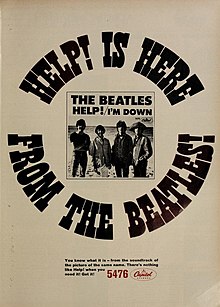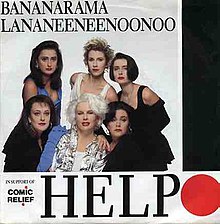
Help! is the fifth studio album by the English rock band the Beatles and the soundtrack to their film of the same name. It was released on 6 August 1965 by Parlophone. Seven of the fourteen songs, including the singles "Help!" and "Ticket to Ride", appeared in the film and take up the first side of the vinyl album. The second side includes "Yesterday", the most-covered song ever written. The album was met with favourable critical reviews and topped the Australian, German, British and American charts.

"Get Back" is a song recorded by the English rock band the Beatles and Billy Preston, written by Paul McCartney, and credited to the Lennon–McCartney partnership. It was originally released as a single on 11 April 1969 and credited to "The Beatles with Billy Preston". The song is one of the few examples of John Lennon featuring prominently as lead guitarist. The album version of this song contains a different mix that features a studio chat between Paul McCartney and John Lennon at the beginning, which lasts for 20 seconds before the song begins, also omitting the coda featured in the single version, and with a final dialogue taken from the Beatles' rooftop concert. This version became the closing track of Let It Be (1970), which was released just after the group split up. The single version was later issued on the compilation albums 1967–1970, 20 Greatest Hits, Past Masters, and 1.

"With a Little Help from My Friends" is a song by the English rock band the Beatles, from their 1967 album Sgt. Pepper's Lonely Hearts Club Band. It was written primarily by Paul McCartney with contributions from John Lennon and sung by drummer Ringo Starr, his lead vocal for the album. As the second track on the album, it segues from the applause on the title track.

"Let It Be" is a song by the English rock band the Beatles, released on 6 March 1970 as a single, and as the title track of their album Let It Be. It was written and sung by Paul McCartney, and credited to the Lennon–McCartney partnership. The single version of the song, produced by George Martin, features a softer guitar solo and the orchestral section mixed low, compared with the album version, produced by Phil Spector, featuring a more aggressive guitar solo and the orchestral sections mixed higher.
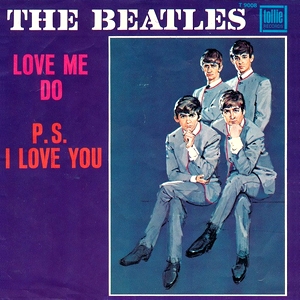
"Love Me Do" is the debut single by the English rock band the Beatles, backed by "P.S. I Love You". When the single was originally released in the United Kingdom on 5 October 1962, it peaked at number 17. It was released in the United States in 1964 and topped the nation's song chart. Re-released in 1982 as part of EMI's Beatles 20th anniversary, it re-entered the UK charts and peaked at number 4. "Love Me Do" also topped the charts in Australia and New Zealand.

"Paperback Writer" is a song by the English rock band the Beatles. Written primarily by Paul McCartney and credited to the Lennon–McCartney partnership, the song was released as the A-side of their eleventh single in May 1966. It topped singles charts in the United Kingdom, the United States, Ireland, West Germany, Australia, New Zealand and Norway. On the US Billboard Hot 100, the song was at number one for two non-consecutive weeks, being interrupted by Frank Sinatra's "Strangers in the Night".

"You Won't See Me" is a song by the English rock band the Beatles from their 1965 album Rubber Soul. It was written by Paul McCartney and credited to Lennon–McCartney. As with songs such as "We Can Work It Out" and "I'm Looking Through You" from the same period, the lyrics address McCartney's troubled relationship with Jane Asher and her desire to pursue her career as a stage and film actress. The Beatles recorded the song during what author Mark Lewisohn describes as a "marathon" final recording session for Rubber Soul, to ensure the album's pre-Christmas release.

"Real Love" is a song written by the English musician John Lennon, formerly of the Beatles. He recorded six demos of the song in 1979 and 1980 with "Real Life", a different song that merged with "Real Love". In 1988, the sixth take was posthumously released for the documentary soundtrack Imagine: John Lennon. In 1995, his demo was completed by his former Beatles bandmates as part of the Beatles Anthology project, along with "Free as a Bird".

"Come Together" is a song by the English rock band the Beatles, written by John Lennon and credited to Lennon–McCartney. The song is the opening track on the band's 1969 album Abbey Road and was also released as a double A-side single with "Something". The song reached the top of the charts in the United States and Australia but peaked at No. 4 in the United Kingdom.
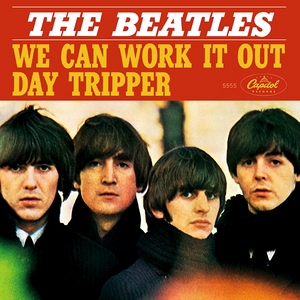
"Day Tripper" is a song by the English rock band the Beatles that was released as a double A-side single with "We Can Work It Out" in December 1965. The song was written primarily by John Lennon with some contributions from Paul McCartney and was credited to the Lennon–McCartney partnership. Both songs were recorded during the sessions for the band's Rubber Soul album. The single topped charts in Britain, Ireland, the Netherlands and Norway. In the United States, "Day Tripper" peaked at number five on the Billboard Hot 100 chart and "We Can Work It Out" held the top position.

"The Ballad of John and Yoko" is a song by the English rock band the Beatles that was released as a non-album single in May 1969. It was written by John Lennon and credited to the Lennon–McCartney partnership, and chronicles the events surrounding the wedding of Lennon and Yoko Ono. The song was the Beatles' 17th UK number-one single and their last for 54 years until "Now and Then" in 2023. In the United States, it was banned by some radio stations due to the lyrics' reference to Christ and crucifixion. The single peaked at number 8 on the US Billboard Hot 100. The song has subsequently appeared on compilation albums such as Hey Jude, 1967–1970, Past Masters, and 1.

"Oh! Darling" is a song by the English rock band the Beatles, appearing as the fourth song on the 1969 album Abbey Road. It was written by Paul McCartney and credited to Lennon–McCartney. Its working title was "Oh! Darling ". Although not issued as a single in either the United Kingdom or the United States, a regional subsidiary of Capitol successfully edited it as a single in Central America, having "Maxwell's Silver Hammer" as its B-side. It was also issued as a single in Portugal. Apple Records released "Oh! Darling" in Japan with "Here Comes the Sun" in June 1970.

"Please Please Me" is a song released by the English rock band the Beatles. It was their second single in the United Kingdom, and their first in the United States. It is also the title track of their first LP, which was recorded to capitalise on the success of the single. It is a John Lennon composition, although its ultimate form was significantly influenced by producer George Martin.
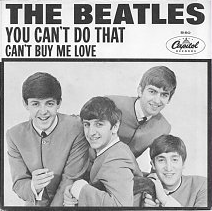
"You Can't Do That" is a song written by John Lennon and released by the English rock band the Beatles as the B-side of their sixth British single "Can't Buy Me Love". It was later released on their third UK album A Hard Day's Night (1964). A live rendition of the song was released on the 2016 re-release of The Beatles at the Hollywood Bowl.

"You're Going to Lose That Girl" is a song by the English rock band the Beatles from their 1965 album and film Help! Credited to the Lennon–McCartney songwriting partnership, the song was mostly written by John Lennon with contributions from Paul McCartney.
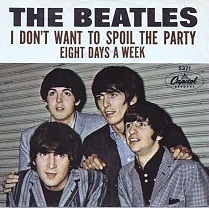
"I Don't Want to Spoil the Party" is a song by the English rock band the Beatles, written by John Lennon and credited to Lennon–McCartney. It was released on the album Beatles for Sale in the United Kingdom in December 1964. "I Don't Want to Spoil the Party" was also released on the Beatles for Sale EP.
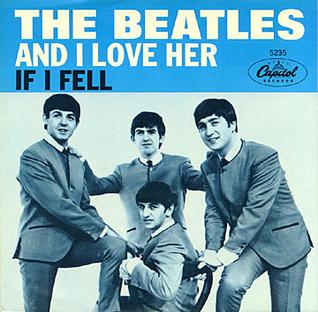
"And I Love Her" is a song recorded by English rock band the Beatles, written primarily by Paul McCartney and credited to the Lennon–McCartney partnership. It is the fifth track of their third UK album A Hard Day's Night and was released 20 July 1964, along with "If I Fell", as a single release by Capitol Records in the United States, reaching No. 12 on the Billboard Hot 100.

"Please Mr. Postman" is a song written by Georgia Dobbins, William Garrett, Freddie Gorman, Brian Holland and Robert Bateman. It is the debut single by the Marvelettes for the Tamla (Motown) label, notable as the first Motown song to reach the number-one position on the Billboard Hot 100 pop singles chart. The single achieved this position in late 1961; it hit number one on the R&B chart as well. "Please Mr. Postman" became a number-one hit again in early 1975 when The Carpenters' cover of the song reached the top position of the Billboard Hot 100. "Please Mr. Postman" has been covered several times, including by the British rock group the Beatles in 1963. The 2017 song "Feel It Still" by Portugal. The Man draws on "Please Mr. Postman" and includes a credit for Brian Holland.

"Do You Want to Know a Secret" is a song by English rock band the Beatles from their 1963 album Please Please Me, sung by George Harrison. In the United States, it was the first top ten song to feature Harrison as a lead singer, reaching No. 2 on the Billboard chart in 1964 as a single released by Vee-Jay, VJ 587. In the UK, Billy J. Kramer released a cover of the song as his debut single, reaching No. 1 on the NME singles chart and No. 2 on the Record Retailer chart.

"Magical Mystery Tour" is a song by the English rock band the Beatles and the title track to the December 1967 television film of the same name. It was released on the band's Magical Mystery Tour soundtrack record, which was a double EP in Britain and most markets but an album in America, where Capitol Records supplemented the new songs with tracks issued on the Beatles' 1967 singles. The song was written primarily by Paul McCartney and credited to the Lennon–McCartney partnership.

